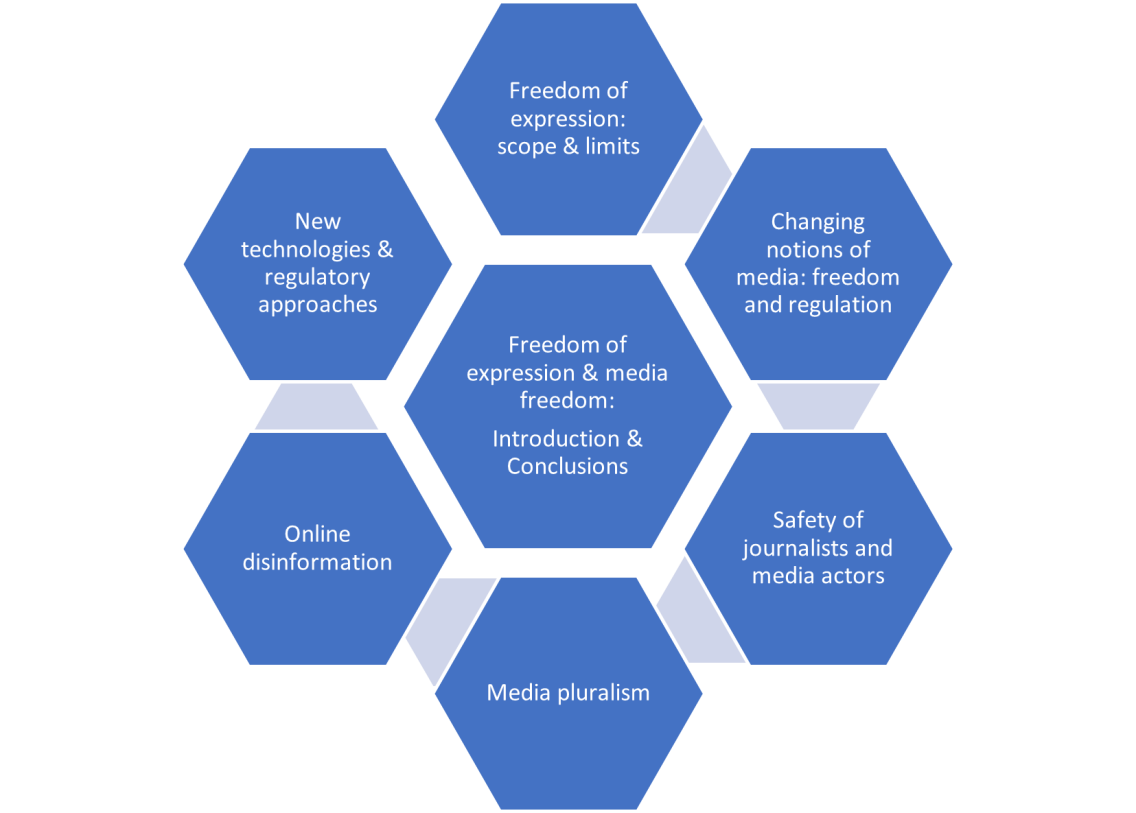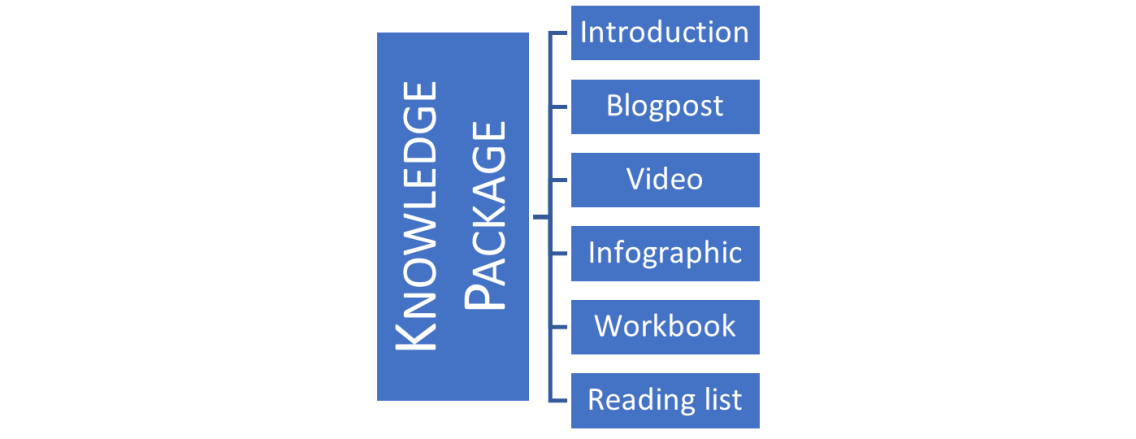Welcome to the homepage of the ‘From mastering to making media law educational materials’ project.
This is a novel curriculum co-creation project: a team of university researchers/lecturers and master’s students collaborated to create a range of audiovisual and digital educational resources focusing on freedom of expression and media freedom. The students received training in didactic and various communicative skills. The project’s resources are suitable for use in educational and training settings. Dr. Tarlach McGonagle, Institute for Information Law (IViR), Amsterdam Law School, University of Amsterdam, designed and led the project, which was financed by a Comenius Teaching Fellowship Project (2020-21, extended due to Covid-related delays).
Project summary
It is often said that if you truly master something, you should be able to teach it. Some would even venture that you only truly master something when you are able to teach it. This project goes further: mastery means not only being on top of your educational materials and being able to teach them, but also being able to design and develop them. The project trained and guided master’s students specializing in international media law to enable them to design and develop a range of audiovisual and digital educational resources in their area of specialization.
Such resources are badly needed, as we saw during the Covid-19 crisis and the enforced switch to online teaching. They are badly needed not only in formal educational settings, but also for a wider range of educational and training purposes across civil society.
For formal educational purposes, it is challenging to find open-access resources designed with thematic and methodological coherence, and suitable for different levels. Existing resources used within curricula are typically pieced together from different sources and contexts. Knowledge- and capacity-building workshops for NGOs with focuses on freedom of expression, safety of journalists, media law and policy and the information society, face the same curriculum design challenges.
This project addresses these curricular needs; we have created a range of appealing online educational resources to cater to the needs of specialized university education and professional training.
The resources are open access. They may be used in accordance with the following CC licence
(For more detailed information about the project, please see further, below.)
Themes and structure
The project’s overarching themes, freedom of expression and media freedom, have been organised around six specific, complementary themes; they are bracketed by a general introduction and a general conclusion. The six themes – or Knowledge Packages (KPs) – are:
- Freedom of expression: scope and limits
- Changing notions of media: freedom and regulation
- Safety of journalists and media actors
- Media pluralism
- Online disinformation
- New technologies and regulatory approaches

Each KP comprises: an introduction, a blogpost, a video, an infographic, a workbook and a reading list.

The introduction to each KP introduces its thematic focuses; sets out the intended learning outcomes and explains the structure of the KP, in particular how the different pieces of output relate to each other. A blogpost, video and infographic together form the main substantive output for each KP. These items address different, complementary aspects of the KP’s main themes.
The digital workbooks typically comprise: (i) a set of short questions, and (ii) two assignments. The questions are short and to-the-point; they are designed to test users’ knowledge of the subject matter addressed in the KP. The assignments alternate between preparatory assignments – to prime users in advance of a tutorial, seminar or workshop – and ‘live’ assignments – unveiled in classroom or workshop settings. The assignments, whether preparatory or in-class, are designed to enable groups of students or professionals to explore the subject matter collectively and in further depth. The lecturer or trainer can use the assignments to bring the issues under discussion to life.
The reading lists have been curated carefully and they are not just lists of recommended reading. Besides suggestions for further reading, they also list various databases, online resources, research tools, courses, videos and podcasts, etc. These lists of selected additional resources are designed to launch pathways towards further specialisation in the subjects addressed in the KP. We are progressively supplementing these lists with ‘annotated’ lists, which give brief explanations of the focus and value of all the recommended materials – another very useful service to users.
Project aims and description
This project has two key aims. First, it seeks to equip students with the unique combination of pedagogical and communication skills needed to be pioneers in the production of educational resources for their peers and the wider community. This is an underdeveloped path in broader experiential learning programmes. Second, it seeks to generate a sustainable set of educational resources that have a coherence of purpose, theme and methods, and which can be used for teaching and training purposes. This will fill an important resource gap in educational and civil society circles.
Benefits for participating lecturers and students
The project has clear, multiple benefits for participating students. It will allow them to:
- Develop pedagogical skills;
- Synchronize their declarative and functioning knowledge and deepen their understanding of media law;
- Reflect on the process and challenges of designing and packaging content for didactic purposes;
- Professionalize and diversify their audiovisual and digital communication skills.
Benefits for education and (civil) society
The project’s key output is quality audiovisual and digital resources for a variety of educational and training purposes. The content and formats will hopefully appeal to their target audiences. The content has been prepared in Knowledge Packages (KPs) covering six themes relating to freedom of expression/media law. Each KP is a rounded mix of accessible and in-depth materials that lend themselves to wide dissemination and uptake.
Activities and methods
All preparatory activities were grounded in the “life-cycle” of the Information Law LL.M. programme, Amsterdam Graduate School of Law, University of Amsterdam. They were thus synchronized with the growing knowledge of the students, who took the courses Information Law and International Media Law, Policy & Practice.
The project has particular importance for preparing law students for professional practice. The multi-faceted nature of legal professional practice is often underappreciated. Besides practising as a lawyer, legal expertise is much sought-after within civil society organisations, to guide team members or to help advise project developers or grantees, often in different countries subject to different national legal regimes, but shared European/international legal frameworks. Information law students have limited opportunities to apply their knowledge in such complex contexts, with the added challenge of translating esoteric knowledge to wider non-specialist groups. Yet, one of the key end-terms of our LL.M. programme is the ability to participate effectively in academic and non-academic discussions within their field of expertise. Given the nature of the KPs produced within this project, students are going beyond this end-term. They are not only participating in relevant discussions, they are selecting and shaping how targeted groups understand key themes in their specialized domain. These high-level cognitive and communicative skills are eminently transferrable within the legal profession. The KPs have to be accurate, accessible and appealing: key ingredients of briefings and trainings within any organisation.
Students worked in pairs to stimulate cooperation and peer-learning; to ensure focused/coherent output, and to divide the workload.
Credits and acknowledgements
The core team was: Tarlach McGonagle (Project Leader), Arlette Meiring, Melinda Rucz, Max van Drunen, Katie Pentney and Doris Buijs.
Others participated actively during different stages: Luna Schumacher, Menno Muller, Camille Hocquet, Jessica Bus, Lisa Uppelschoten, Sophie Davidse and Sophie van Dongen.
The team is very grateful to Dr. Stefan Kulk and Roel Maalderink for the excellent trainings they gave us on writing (academic) blogposts and video presentation skills, respectively.
The team is also very grateful to Anouschka Boswijk (Kopfkino) for producing the ‘Republic of Expressia’ infographic for KP1.
Our thanks are also due to the numerous colleagues and students who provided concrete feedback on various draft versions of the project’s output, in writing or at (proof-of-concept) workshops: Jen Adams, Onur Andreotti, Lotte van den Bosch, Sarah Clarke, Silvia de Conca, Imber van Dijk, Julia Hoffmann, Mervin Huang, Bojana Kostić, Claudia Padovani, Anna Smulders, Emma de Vries.
Resources for lecturers and trainers
We are currently preparing additional resources for lecturers and trainers, which we will post on this website when they are ready.
The video scripts and indicative answers to the knowledge questions are available on request – if you are interested, please contact the Project Leader.
Requests for permission to translate the project’s materials are welcome and should be directed to the Project Leader.
Looking ahead
The existing modules will be supplemented with new modules on a variety of themes, possibly including: Strategic Lawsuits against Public Participation (SLAPPs); minorities and the media; minors and the media; public service media; media and information literacy; access to information; and the United Nations and freedom of expression and information.
The new modules will be produced on a rolling basis according to the same methodology and design.
The Project Leader is currently seeking funding to have the materials translated into Ukrainian, in order to support (online) university education and trainings in the country. Offers and suggestions to this end would be very welcome.